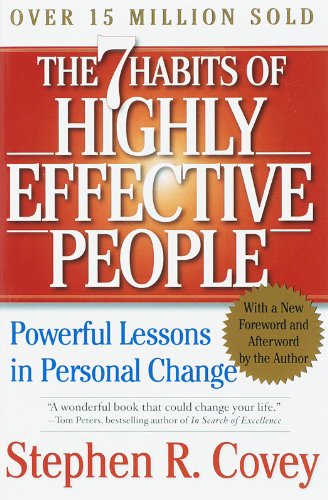This week measured the passing of a titan, Stephen Covey (Snr), the author of one of the seminal books on personal achievement “The Seven Habits of Highly Effective People“. Stephen was also widely recognised was one of the 10 most influential people in business in the 20th century.
It is almost impossible not to have come across Stephen’s work because the principles have become so embedded in modern business practice. It is thoroughly worth the read and is as relevant today as it was in 1989 when the book was first released.

Can you remember what those 7 habits actually are? I struggled, and refreshed my memory of the book by downloading an abridged version as an audiobook from www.audible.com playing it back in the car as I drove up the freeway. Wikipedia also has a good summary. I was struck afresh at how these habits are a precondition to a success in any endeavour, and particularly in rapidly growing businesses. In a business context, here is my summary of them.
This article deals with the first three habits of highly effective people. These are centred around “Self Mastery” – the basic “get your act together” material that generates personal and business achievement. In a second article I will cover the Interdependence or “achieving through people” habits.
1. Be proactive. The key message of the entire book is contained in this habit. The nub of the message is this: “if you want to achieve something and things are not working because you think someone or some obstacle is standing on your way, that thought is the problem. The real question is “how can I change to achieve my goal given the environment I am in”. That is a mantra for business in the 21st century.
Take the situation of the major retailers and the dairy industry. For months this story has run as a campaign by dairy companies to get the retailers to raise their prices in the middle of a price war and/or blame the retailers for the demise of margins in their industry as consumers shifted their buying preference to low cost private label milk. Irrespective of who occupied the moral high ground, this sounded like a strategy that put a lot of effort into a campaign that was unlikely to build short term sales of branded milk for dairy companies – limited effectiveness. Then a stroke of genius in market research revealed that the vast majority of consumers did not want permeate additives in their milk. The dairy companies changed their thinking about their approach and commenced marketing permeate free milk, moving the war to a different battleground. This in turn created an increased demand for branded milk and a turn by consumers away from private label without the need to battle the immovable retailers. Someone in the executive teams of the dairy companies changed their paradigm from one of reactivity – “I am a victim at the hands of the retailers”, to one of proactivity “let’s create a new market”.
2. Begin with the end in mind. This habit is centred around identifying roles, relationships and goals to progress activities that connect to your key values. Lost you yet? What do “values”, roles, relationships and goals have to do with adding 50% to your top line for the new financial year?
One of our clients in the cosmetics industry, Illamasqua, is illustrative. Cosmetics is a fiercely competitive industry. One end of the industry faces the threat of a move to generic brands and warehouse retailers. The other end of the industry is inhabited by the indomitable cosmetics leviathans and their unlimited marketing budgets.
There is fierce competition for floorspace in high street retailers who can pick and choose favourites. How then do you outperform the leviathans? In Illamasqua’s case, the answer started with a very clear definition of values; connecting to the counter culture and cult pop/ fashion movement. Illamasqua connects to the desire to self express/ show off your alter-ego and stand out through professional make-up with a focus specifically on performance for night time partying. Think Lady Gaga. The goals connected with this values statement went far beyond merely making money from selling cosmetics. The brand occupys a position as an ambassador and educator for the counter culture. Delivering on this goal statement required a clear definition of the roles the brand plays in the market place and the relationships the brand has with its customers.
A key role was as a teacher – the “how-to” of make-up artistry – creating a “school of make-up art”, and a shop floor environment to educate customers. Another key role was to act as an ambassador for alternative culture and an understanding of people who are “different”. This is embodied in the Sophie Lancaster Foundation. The foundation’s purpose is to educate and create tolerance and understanding of subcultures. Finally there was the role of social connector using social media in all its guises to provide a platform for individuals to express themselves and share experiences.
Outperforming the major brands was no accident, it was the result of a very clear vision defined not just in writing, but in web media, art videos, and
roles and relationships that made the brand live with customers.
3. Put first things first. This habit deals with the “urgency addiction”. That is, many of us love the adrenalin rush of having many urgent
tasks. But in our frenzy to do everything that is urgent and tick off that do-to list, we can overlook those things that are truly important and where
enduring value is created.
You know the drill. You know that the enduring value comes from your plan to set up meetings with your key customers to expand relationships, get feedback and deepen awareness of your products and services. But first you have to do the IT update to your server, reconcile the sales figures that don’t make sense, negotiate the overdrawing on your account with the bank, deal with the staff squabbles at the warehouse, read about Tom and Katie’s bust up in New Idea, defend the worker’s compensation claim that was faxed to you by the ambulance chasing law firm your worst performing employee has engaged to represent him in the “office chair incident”. And get home in time to read the kids a bedtime story and be a loving engaged life partner to your significant other.
Yes, we are in the realm of time management. Stephen advocates a 4 quadrants model breaking activities into urgent/ important (prioritise), not urgent/ important (book time for), urgent/ unimportant (delegate), not urgent/ not important (drop). There is a maze of paper systems out there based on this model that might have destroyed forever your passion for this type of personal planning. I have good news. In the age of technology the app store is your friend. Try Priority Matrix to name but one of many.
Stephen coins a great phrase about having “integrity in the moment of choice”. That is, in that moment where you decide to (a) read another spam email or (b) phone your key customer who just complained about service, integrity in doing what you know is right is the key. Even though the important action is also the hard one.
Next time, we’ll shift the discussion to the “Interdependence” and “Renewal” habits. These are the 4 habits that deal with achieving things with and through people. I look forward to sharing them with you.



